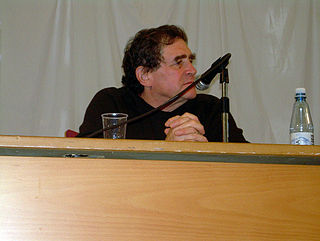A Quote by Fred Brooks
The fundamental problem with program maintenance is that fixing a defect has a substantial chance of introducing another.
Quote Topics
Related Quotes
The real people who hold our civilization together are the maintenance people. If it weren't for them - pumping water out of subways, painting bridges to keep from rusting, fixing a steam pipe that is 70 years old - we'd be sunk. If we got rid of all the politicians and the policymakers in the world, the world would keep going. If you get rid of maintenance people, the whole thing breaks down.
According to Shiva, life is in the end about fixing holes. Shiva didn't speak in metaphors. fixing holes is precisely what he did. Still, it's an apt metaphor for our profession. But there's another kind of hole, and that is the wound that divides family. Sometimes this wound occurs at the moment of birth, sometimes it happens later. We are all fixing what is broken. It is the task of a lifetime. We'll leave much unfinished for the next generation.



































